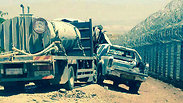
Missile was fired from Syrian army position, says senior defense source
Analysis: Military establishment certain the anti-tank missile that killed Israeli teen on Golan Heights was fired by
Sources believed that there was more than one perpetrator and that the shooters were Syrian soldiers of the 90th brigade. The IDF attacked its command posts and artillery positions even before the intelligence had been verified.
Syria claimed that four people were killed and nine injured in the Israeli retaliation, and that the posts and equipment sustained heavy damage.
Related stories:
- At least 10 Syrian soldiers killed in IAF strikes, NGO claims
- Israel launches strikes on targets in Syria
After the incident, the intelligence community had assumed the shooters were militia troops working on behalf of Hezbollah or with its assistance to fight on the side of Syrian President Bashar Assad.
The underlying assumption was that the Syrian military had vested interest in avoiding a direct confrontation with Israel, as it may weaken its capabilities in fighting the rebel forces. These basic assumptions are now being reexamined by the intelligence community.
One of the explanations provided for the incident was the possibility that it was the independent initiative of an officer or group of soldiers acting without orders from their commanders.
The anti-tank missile – an advanced Kornet model – blasted into the security barrier. The shrapnel and metal fragments from the fence hit the Israelis, as the missile is equipped with homing capabilities which allow accurate targeting from up to 10 km away.
The missile was fired from a short distance, a worrying fact for the military with dangerous implications. It is likely the IDF will change its operational directives and the precautionary measures taken to secure the barrier.
There was at least one case of a Syrian soldier firing a heavy machine gun of his own volition towards an IDF patrol keep driving on the Israeli side of the fence. The latest incident is similar, though significantly worse because of the type of weapon used in the attack.
A defense official explained that it is possible the incident occurred because the Syrian army has been facing a severe deterioration in unit discipline for more than a year.
Earlier Monday, the Syrian government acknowledged that Israeli warplanes struck targets inside its territory in its first comment on the incident. A statement issued by the Foreign Ministry says Israeli forces carried out "a new aggression" on Sunday and Monday on positions inside Syria.
It said the air raids were a sign of the "direct and continuous support" that Israel is giving to rebels fighting to topple President Bashar Assad.
Wanted Hamas members disappear
The IDF decided Monday to reduce the size and rate of operations intended to destroy Hamas' infrastructure in the West Bank. One of the problems faced by the Israeli military is that the wanted Hamas members and activists which the IDF has yet to arrest have escaped and gone into hiding until operations subside.
The defense minister and prime minister decided to continue operations, but base them solely on intelligence and only in an area that may produce actual results.
The operations to return the kidnapped teens will continue with the same intensity for at least a few more days. Only then will a decision be made on whether to reduce the size of the forces and replace them with covert intelligence operations.










